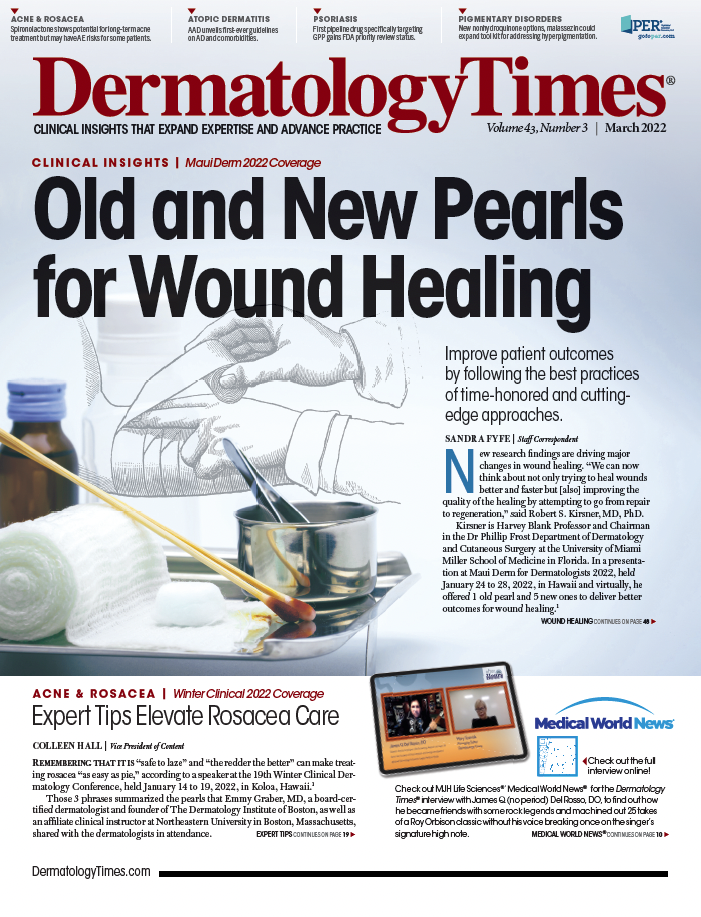- Case-Based Roundtable
- General Dermatology
- Eczema
- Chronic Hand Eczema
- Alopecia
- Aesthetics
- Vitiligo
- COVID-19
- Actinic Keratosis
- Precision Medicine and Biologics
- Rare Disease
- Wound Care
- Rosacea
- Psoriasis
- Psoriatic Arthritis
- Atopic Dermatitis
- Melasma
- NP and PA
- Skin Cancer
- Hidradenitis Suppurativa
- Drug Watch
- Pigmentary Disorders
- Acne
- Pediatric Dermatology
- Practice Management
- Prurigo Nodularis
- Buy-and-Bill
Publication
Article
Dermatology Times
Expert Pearls for Treating Rosacea Patients
Author(s):
Treating these patients can be a challenge, but it can also be ‘as easy as pie’ if you follow these tips.
Remembering that it is “safe to laze,” and “the redder the better,” can make treating rosacea “as easy as pie,” according to a speaker at the 19th Winter Clinical Dermatology Conference, being held January 14 to 19, in Kauai, Hawaii.1
Emmy Graber, MD, board-certified dermatologist and founder of the Dermatology Institute of Boston, and affiliate clinical instructor, Northeastern University, shared these 3 pearls with the dermatologists in attendance, encouraging them that it is, in fact, acceptable to begin pulse dye lasers combined with or immediately after low-dose isotretinoin, a practice once thought incorrect.
She cited 2 different studies by Spring and Ibrahim et al, that showed this practice is safe. One of the papers was a review of 32 publications reporting 1485 procedures, that concluded: “there was insufficient evidence to support delaying manual dermabrasion, superficial chemical peels, cutaneous surgery, laser hair removal, and fractional ablative and nonablative laser procedures for patients currently receiving or having recently completed isotretinoin therapy.”2
The second paper, which looked at patients with 46 patients with acne who were divided into 2 groups, 1 of which was treated with just oral isotretinoin (0.5 mg/kg/day), and compared them with a second group treated with oral isotretinoin and 5 sessions of pulse dye laser. In that study, the combined groups showed a statistically significant greater improvement regarding all parameters.3
The second pearl Graber shared from her own practice, which is the “redder the better.” She said often patients will tell the physician when their rosacea flares, and a lot of times, it’s after high heat situations, like getting out of the shower or working out. She said she recreates this type of situation by keeping a hairdryer in her office and recreating the flared red appearance, to provide a clearer target for the laser.
Finally, Graber reminded her audience about the “easy as pie” rule, which means treating the post-inflammatory erythema with 3 monthly PDL treatments.
In a separate session at the meeting, Graber told the audience that “several studies have shown that basic skin care alone can improve rosacea symptoms,” and she advised the audience to share some cleansing pearls with patients with rosacea, including moisturizing and washing the face with mild products. She also advises her patients to use sunscreens and avoid alcohol-based products.
“I tell my patients to check all their products for anything on them that says alpha-hydroxy acids,” she said. “These are the things we want our patients to avoid because it exacerbates their rosacea.”4
References:
- Del Rosso JQ, Bhatia ND, Graber EM, Harper JC. Clinical and therapeutic pearls in acne and rosacea. Presented at: 2022 Winter Clinical Dermatology Conference; January 14 to 19, 2022; Kauai, Hawaii.
- Spring LK, Krakowski AC, Alam M, et al. Isotretinoin and timing of procedural interventions: A systematic review with consensus recommendations. JAMA Dermatol. 2017;1:153(8):802-809.
- Ibrahim SM, Farag A, Hegazy R, et al. Combined low-dose isotretinoin and pulsed dye laser versus standard-dose isotretinoin in the treatment of inflammatory acne. Lasers Surg. Med. 2021;53(5):603-609.
- Graber EM. What’s new and hot in rosacea. Presented at: 2022 Winter Clinical Dermatology Conference; January 14 to 19, 2022; Kauai, Hawaii.







